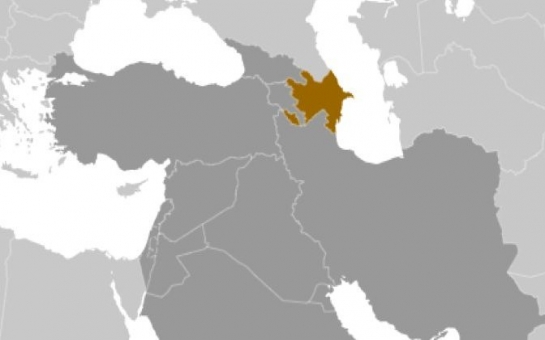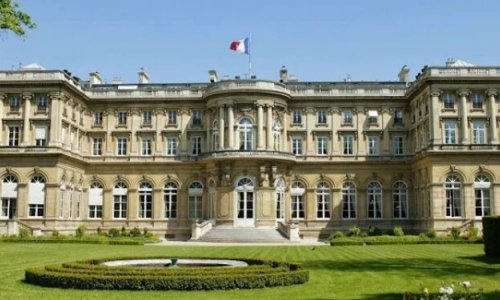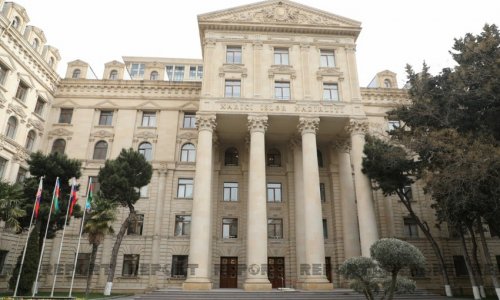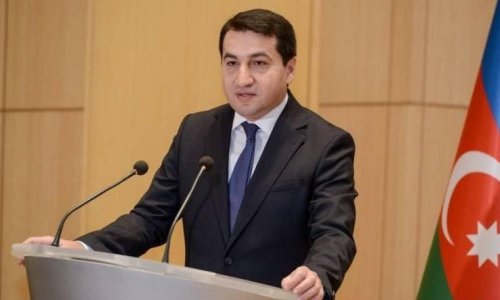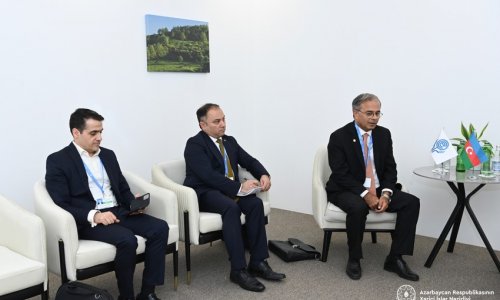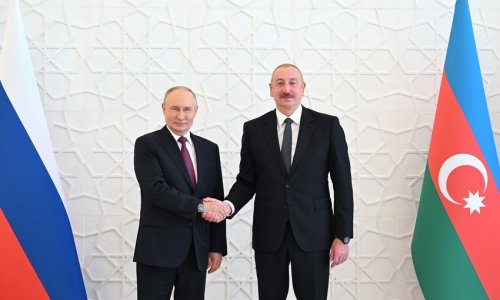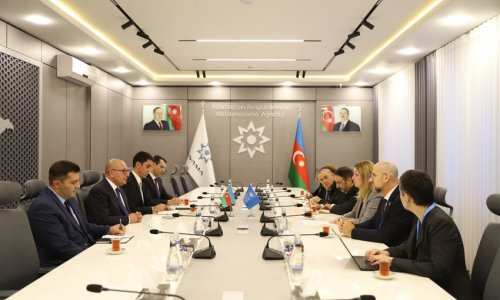By Fuad Huseynzada
(Eurasia Review) — German Foreign Minister Frank-Walter Steinmeier visited Azerbaijan as part of his official tour in the South Caucasus countries. The negotiations of Steinmeier, one of the key figures in the EU foreign policy, with President Ilham Aliyev and the Azerbaijani foreign minister made it clear that this region remains in the focus of the “Old World”.
In a press briefing after the talks, the German foreign minister spoke at length about the importance of relations with Azerbaijan. He noted the high level of relations between Baku and Berlin, and the presence of Germany’s only regional Foreign Chamber of Commerce in Azerbaijan is an evidence of the importance that his country places to the relations with Azerbaijan.
In addition, Berlin attaches great importance to the expansion and deepening of cooperation with states within the framework of Eastern Partnership, and Azerbaijan is given a special place here.
According to Steinmeier, from a strategic point of view Azerbaijan plays an important role as a bridge between East and West, as well as in ensuring energy security. In this regard, the German diplomat noted the importance of the Southern Gas Corridor initiated by Azerbaijan.
He stated that “the Southern Gas Corridor is an ambitious project aimed at the future and opens new prospects within the framework of bilateral cooperation not only between Azerbaijan and Germany, but also between Baku and Europe.”
Furthermore, Steinmeier touched on the Nagorny Karabakh problem. Moreover, the minister made it clear that it was one of the major topics during his talks in Baku. He said that Berlin wants to enhance the role of the EU in the Karabakh settlement. “We would like the European Union, together with the OSCE Minsk Group, to play an active role in resolving the conflict too,” he said.
According to many observers, the German foreign minister’s visit to the South Caucasus demonstrates Europe’s interest in putting an end to the Nagorny Karabakh problem, as well as Europe’s dependence on Russian gas.
For example, the publication EU Business draws attention to the fact that the German foreign minister’s visit to Baku took place on the eve of the summit on Karabakh in Paris, as well as immediately after Steinmeier’s talks with US Secretary of State John Kerry in Berlin devoted mainly to the Ukrainian subject. “Steinmeier’s visit is seen as another meeting in the context of solving the serious dispute over gas prices between Russia and Ukraine amid fears that Moscow may stop important gas supplies to Europe this winter,” the newspaper notes.
“The German foreign minister’s visit is a clear signal of the importance Germany attaches to the South Caucasus region. In light of the conflict in Ukraine, the EU should pay much more attention to the Nagorny Karabakh conflict, which in fact is not “frozen”. After all the latest developments and disappointments associated with Armenia, we must strengthen ties with our partner – Azerbaijan,” the well-known German journalist and publicist Richard Kissler told R+.
It must be noted that Germany is one of the leading EU countries. We can even say that it is the locomotive of the organization and its ideological center. In this capacity, Germany today has to deal with a large number of issues related to problems both inside the country and in the EU. Plus, Germany takes an active part in the resolution of crises in EU neighbors, including the situation in Ukraine. But the fact that the German foreign minister took the time to visit the South Caucasus despite such a full agenda should not be surprising. Moreover, R+ has learned from diplomatic sources that Foreign Minister Steinmeier’s visit should be considered as preparation for the upcoming visit of German Chancellor Angela Merkel.
The interest of Europe in Azerbaijan can be seen against the background of unprecedented growth in the relations between Baku and Moscow. As a result, there was an unprecedented series of visits, which many even be called as the “honeymoon” in Russian-Azerbaijani relations. Of course, Europe cannot ignore all this, and with understandable anxiety. The events in Ukraine became the most dramatic example of Russia’s categorical unwillingness to give up its position in the post-Soviet space, in the area of its historical responsibility. The strengthening of Russia’s position in the South Caucasus – or to be more precise, in Azerbaijan – is not at all part of the European Union’s plan, which has its own visions of this region, although it has not yet shown it so clearly.
The price of the geopolitical struggle for the South Caucasus between Russia and the EU and in a broader sense – for the energy-rich Caspian region – is great. And reducing Europe’s dependence on Russian gas is one of the priorities of the European Union, Maros Sefcovic, the successor to Stefan Fule in the post of European Commissioner for EU Enlargement, said recently.
According to him, the EU will focus on reducing Europe’s dependence on Russian gas and support for projects with the participation of Azerbaijan, Turkmenistan and other countries. “Support for the South Stream project will only increase our dependence on Russia. We’d rather support the Southern Corridor project that will connect us with the Caspian Sea,” Sefcovic said.
Even though the skeptics claim that Azerbaijan’s hydrocarbon reserves are not enough to meet the demands of the whole of Europe, the Europeans continue to pin hopes on the construction of the trans-Caspian pipeline, which will open their way to the rich gas reserves of Central Asia, especially as Turkmen President Gurbanguly Berdi-Muhamedow said at the last summit of the Caspian countries that laying a pipeline under the Caspian Sea is only the business of the states through the territory of which the pipeline passes. Furthermore, he recently instructed the government to speed up the work on this project. In the future, if things go well for the Europeans, they will get access to the rich energy reserves of Iran, in respect of which the West is gradually abandoning the policy of sanctions.
It is obvious that what is current events around Ukraine it has forced Western countries to take a more sober look at cooperation with Azerbaijan. The West started to pay noticeably more attention to its eastern neighbors, especially to those which have great natural reserves. Europe needs stable supplies of energy resources today as never before.
To this end, it is important to ensure that the region where the supplies come from stays stable. And this strengthens the motivation of the EU to address more actively the Karabakh issue, which until recently the Europeans regard as something very distant that had nothing to do with them. Europe understands the great importance of resolving the problem number one of Azerbaijan, i.e. the question of restoring the territorial integrity of the republic.
This is the reason for the initiative of French President Francois Hollande to hold a trilateral meeting with the leaders of Azerbaijan and Armenia. After all, it is no secret that the latest meetings of the presidents of the two countries were held under the aegis of Russia.
Russia’s chances of solving this problem still seem preferable. But Europe has no other way, and it is unlikely that it has other arguments to completely put Azerbaijan in its orbit.
Baku is trying to attract widespread international attention to solve the Nagorny Karabakh problem, and Steinmeier’s statement that the EU as an organization should be involved in this process along with the OSCE Minsk Group sounds in unison with the position of Baku, especially as Azerbaijan’s Deputy Foreign Minister Mahmud Mammad-Quliyev said the other day that it was the position of Brussels on Nagorny Karabakh that was a major problem in bilateral relations and expressed the hope that the EU would change its position and demonstrate to the country the same kind of attitude as in the case of Georgia, Ukraine and Moldova. For this reason, it is probably worth expecting Europe’s unprecedented activity in the Karabakh settlement very soon.
Bakudaily.Az

